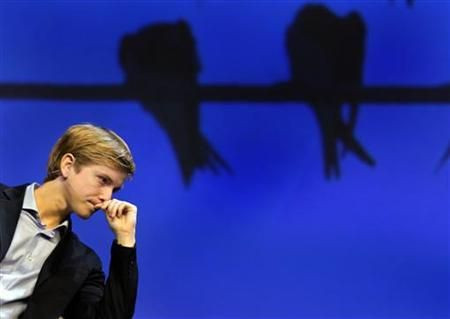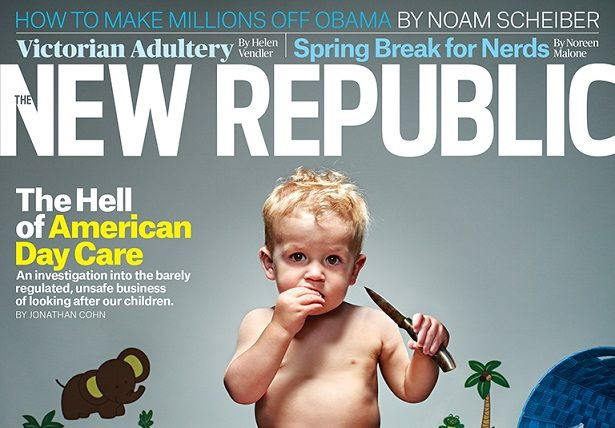New Republic Shakeup Underscores Media’s Tech-Billionaire Problem

It’s been years since The New Republic generated this much attention -- two years, to be exact, since Chris Hughes, Mark Zuckerberg’s onetime Harvard roommate and a Facebook co-founder, bought the storied publication in what appeared a textbook case of a billionaire swooping in to rescue a perpetually struggling journalistic institution.
Apparently, Hughes wants that institution -- one of several glossies that once dominated political discourse in Washington -- to be a business.
On Thursday, Hughes announced that his handpicked editor, Franklin Foer, and the magazine’s longtime literary critic, Leon Wieseltier, were out to make way for a new plan for the 100-year-old magazine. That plan, led by former Yahoo News exec Guy Vidra and former Gawker editor Gabriel Snyder, is what Hughes calls “a vertically integrated digital media company.”
The following day brought histrionics rarely seen in media, let alone the shrinking ranks of print journalism, when 35 writers and editors who once graced the masthead of the magazine asked to be removed. Today Hughes and Vidra took the bizarre step of calling an all-hands meeting -- full of professional question-askers -- and took no questions.
In meeting at @TNR today, CEO Guy Vidra and Publisher Chris Hughes took no questions from staffers. Ended meeting after speaking.
- ErikWemple (@ErikWemple) December 5, 2014At the heart of The New Republic’s retrench, and presumably the reason for the mass departures, is a desire to make the magazine a product compatible with the kind of large audiences Madison Avenue requires to make online advertising a meaningful business. Onetime contributor Jonathan Chait wrote a scathing attack on the efforts so far, including the introduction of “cringe-worthy Upworthy headlines.”
“The problem … is that Hughes and Vidra are afflicted with the belief that they can copy the formula that transformed the Huffington Post and BuzzFeed into economic successes, which is probably wrong, and that this formula can be applied to The New Republic, which is certainly wrong.”
The New Republic dustup caps a difficult fall for tech billionaires looking to put a stamp on a media industry that has been so diminished by the shift to digital. In fact, Hughes is the second such billionaire in the last several weeks to preside over the implosion of a high-profile journalistic endeavor. Pierre Omidyar, the founder of eBay, is currently picking up the pieces at his 1-year-old startup, First Look Media, after the announced departure of two high-profile hires: Matt Taibbi, who had been in charge of launching a new digital magazine molded after his trademark subversive humor and reporting style, and John Cook, editor in chief of First Look’s The Intercept, who will return to his former role at Gawker Media at the end of this year.
In a lengthy explainer posted on the website, Intercept staffers said Taibbi’s departure was the “culmination of months of contentious disputes” with Omidyar. The conflict wasn’t about editorial interference, they explained; nor was it that Omidyar didn’t respect media’s traditional church-state separation. Rather it “centered on differences in management style and the extent to which First Look would influence the organizational and corporate aspects” of Taibbi’s role.
Organizational? Corporate? These are not words independent-minded journalists typically respond to.
In a recent interview with Vanity Fair, Omidyar admitted to being “conflict-averse,” and said he found the process of dealing with people who fundamentally disagree with him “draining.” And yet, as he has no doubt discovered over the last year, it takes strong personalities to steer a media organization toward any kind of success. Taibbi and Cook are successful in their field precisely because they are willing to tick people off -- including their bosses, if need be.

It turns out, the media industry is not as easy as it looks, and not just because it forces conflicting personalities to work together in a single newsroom. It’s a world beset by disruption, with a traditional business model that has been long since gutted by the very industry Omidyar and Hughes come from. Profit margins, if they exist at all, are low, and more than two decades after the rise of the Internet, most media companies are still essentially just throwing ideas against the digital wall to see what sticks. Yesterday it was search. Today it’s social. Tomorrow, who knows?
This is particularly true for legacy media outlets, most of which are straddling a precarious line between searching for ways to grow revenue without alienating the audiences that expect them to stick to with journalistic standards and practices that worked for them in the pre-digital era. The New Republic is as much a victim of this shift as it is of Hughes’ failure to grasp certain tenets of running a magazine. How many of those mourning the decline of this once-great institution have bothered to pick up an actual copy over the last decade?
Perhaps Jeff Bezos, the Amzaon.com founder who scooped up the Washington Post last year, will break the tech-billionaire-turned-media-mogul curse. Reviews so far have been mixed. On the plus side, Bezos added 100 new journalists to the newsroom, but he also slashed pensions and retirement benefits, as Businessweek reported. Whether or not he can steer the ship out of its rough old-media waters remains to be seen. But whatever happens, you can bet it won’t be boring.
Christopher Zara is a senior writer who covers media and culture. Got a news tip? Email me here. Follow me on Twitter @christopherzara.
© Copyright IBTimes 2024. All rights reserved.






















